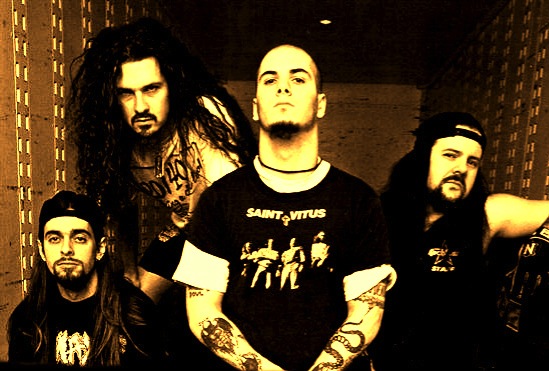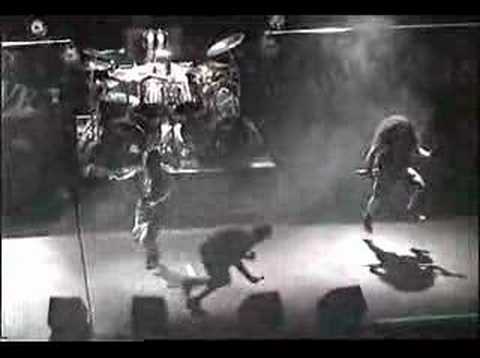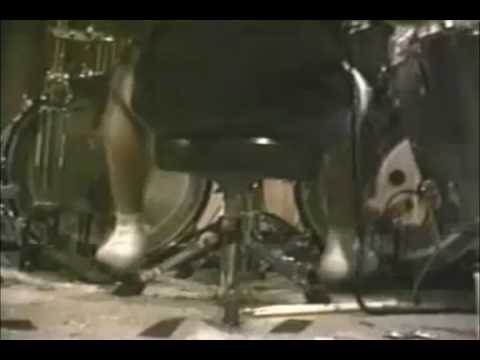"I fucked your girlfriend last night./ While you snored and drooled, I fucked your love."
Now I have your attention, let’s spend five minutes (preferably alone) considering Pantera’s Far Beyond Driven. Their third album proper was commercially the apex of their career – in that it topped the Billboard chart in the US – but also the record that signalled the beginning of the end of the band, the first steps on a dark road that culminated in the murder of its totemic talent, the greatest hard rock guitar player of all time, Dimebag Darrell.
That spoken lyric introduces the track ‘Good Friends And A Bottle Of Pills’, which functions as a joint around which the album pivots. The four songs that precede it exude the swagger and sheer braggadocio that defined Pantera’s breakthrough album Vulgar Display Of Power and particularly its signature song, ‘Walk’. Its key refrain, "Are you talking to me?", echoing Travis Bickle in Taxi Driver and his iconic address to himself in the mirror, both accuses in the second person but is simultaneously self-critical. It encapsulates the confrontation at the heart of Pantera’s work, outwardly manifesting physical threat but also inhabiting an increasingly bleak introspection. This was a period when singer and lyricist Philip Anselmo later compared his energy and confidence to a Slayer concert, before the chronic back pain, before heroin, before Dimebag’s murder, when it all slowed to a Saint Vitus dirge. The pressure to be a ‘Superman’ to his audience and the media began to take its toll.
Compare the two album covers: the blurred-out, fist-to-the-face aggressive energy of Vulgar Display, and the original (subsequently withdrawn) Far Beyond Driven cover, a drill bit inserted into the splayed anus of an anonymous female body, subsequently replaced with a drill into a shaved cranium resembling Anselmo’s. The tone of explicit and degrading cruelty of ‘Good Friends And A Bottle of Pills’ is evident in that original cover, but the replacement shows it can just as easily be self-inflicted. "I serve too many masters" screams a wounded, pitiful Anselmo, describing the wronged boyfriend going on to slit the narrator’s wrists and neck: "But you wouldn’t know what you were doing because I didn’t." On this album, Pantera began to elevate metal music to extreme psychodrama, a form perfected by Korn on their debut (and never recaptured after their sound was codified as ‘nu metal’).
‘Good Friends And A Bottle of Pills’ is, actually, barely a song: a ratatatat rolling double bass tattoo, with the ballast of Rex Brown’s bass, and the wrenched squeals and pinched harmonics of the guitar lines roaring around and vying with the motif. It seems to enact a collapse in songwriting itself, which bleeds into the far less disciplined latter half of the album. When the band used it as an introduction tape to their concerts, the message seemed to be that all bets were off, the track’s tale of lust and retaliation tightening the screw in a charged up atmosphere: anti-music, indigent self-loathing, all kinds of filth were possibilities in the ensuing melee.
On the face of it album opener ‘Strength Beyond Strength’ is an anthem of self-empowerment, though it takes as its opening position pure nihilism ("There is nothing. No education. No family life to open my arms to…"), then downright societal warmongering: "But I’m helping to legalize dope on your pristine streets and I’m making a fortune." The haemorrhaging thrash undercurrent gives way to the kind of breakdown that ensured Pantera concerts were violent arenas of male catharsis, populated by gig goers: "Hard as a rock. Shut like a lock."
What follows though are three of Pantera’s tightest and finest songs: ‘Becoming’, ‘Five Minutes Alone’ and ‘I’m Broken’. ‘Becoming’ boasts some of the finest feet work of drummer (and Dimebag’s older brother) Vinnie Paul, whose double bass pedal fluency locks the riff into a churning cement mixer groove, Darrell’s guitar incandescent and sparking in Catherine Wheel swirls; ‘Five Minutes Alone’ is arguably the greatest riff the band ever produced, expanding on the tight two-note bend-and-snap of ‘Walk’ with an electrifying descending bridge and a grim drag-the-body-to-the-lake momentum; likewise ‘I’m Broken’ locks bassist Rex Brown and Dimebag into a lock-step stoner groove, a succinct masterpiece of pregnant space and weighty craft, topped with a breathtaking, almost wry guitar solo, on an album adorned with surprisingly few of them.
Anselmo reigns supreme over the first half of the album, his lyrics framed and delivered in his (by now familiar) braced, confrontational stance, but also elliptical and obtuse, rich in symbolism and wordplay: "A long time ago I never knew myself. Then the memory of shame birthed its gift." The conviction of growing "Godsize" on ‘Becoming’ is underpinned with an ill-defined abuse (of power) and manipulation: "Belittle your friends to serve me, to suck me, to realize my saving grasp." And on ‘Five Minutes Alone’ it develops into the proclamations of a tyrannical king: "You’ve waged a war of nerves/But you can’t crush the kingdom." (He later transplanted the concept of the ‘War Nerve’ to title their most dissonantly heavy track on their next album). You begin to ask if this tower of strength protests too much.
He switches person on ‘I’m Broken’: his imprecation of "Inherit my life" transmuted to "Inherit your life". Whereas Trent Reznor used to hone all his songs around his ego and id, whether vulnerable ("I hurt myself today") or desirous ("I want to fuck you like an animal"), Anselmo uses Pantera to reflect the world, refract it through his blunt but increasingly nuanced psychology, and then lash out with maximum ferocity. It’s the extent to which the band manages to channel its own burning energy which determines the musicality of their output, but one of the surprises of an album as successful as Far Beyond Driven is how they lose control of that relentless drive: the train comes off the tracks.
‘Hard Lines, Sunken Cheeks’ says it all: "I drink all day. I smoke all day. I take your daughter’s breath away. I’ve done it all but tap the vein." Here is both the vainglorious boasting and the intonation of the band’s undoing. Its lyrics seem to speak to the conflation of the personal body and religious idols; the self-defined "unlord" but also the fascinating self-awareness of Anselmo and the band’s relationship with their own audience, and what responsibility this brings: "As a child I was given the gift to entertain you./ But through blood I inherited a life that could destroy you."
Compare how Anselmo rejects his father in ’25 Years’ and casts himself as the "bastard father" to his fanbase: "You’ll never be the father I am. The bastard father to the thousands of the ugly. Criticized, the unwanted. The ones with fathers just like you. We’re fucking you back." There’s a covenant here, a ‘satanic’ one perhaps ("my soul for a goat"), but when Anselmo technically died for four minutes mid-tour in 1996 as a result of a heroin overdose it problematized this relationship. "I’ve done it all but tapped the vein": Anselmo had been undone by another boast.
This peril of his own personality perhaps accounts for the number of accusations that dogged his career in Pantera: of racism, of homophobia and why some spectators (and for a long time Vinnie Paul) attributed blame to him for adding to a febrile atmosphere of division amongst its fan when Pantera splintered after the turn of the century. Not least pertaining to a comment of Anselmo’s that made it onto the cover of the December 2004 issue of Metal Hammer magazine, when he stated that "Dimebag deserves to be beaten severely". When schizophrenic ex-marine Nathan Gale shot Darrell dead onstage on the anniversary of John Lennon’s murder on December 8 2004 at the Alrosa Villa nightclub in Columbus, Ohio as he was playing the opening songs of new band Damageplan’s set, these words cast a heavy pall over the hand-wringing that followed.
However, there is no evidence that they influenced Gale’s actions.
For an album made ten years earlier at their peak, Far Beyond Driven evinces that the early (musical) cracks were beginning to show. After ‘Slaughtered’, with its sliding riff reminiscent of ‘Mouth For War’ these tracks really lack much structural coherence. The breakdown riff in ‘Use My Third Arm’ was an off-cut from unreleased Vulgar Display track ‘Piss’; ’25 Years’ consists of an off-time single note verse which lacks imagination; ‘Shedding Skin’ is more compelling with its chunky outro giving way to a clean, picked apart spoken verse. But the proof is born out in the live renderings of these tracks: the end of ‘Throes Of Rejection’ was tacked onto the end of ‘Becoming’ and the others were rarely given an airing. In fact these three tracks mirror the earlier exemplary triumvirate but in negative, propelled by a ragged rhythmic play and sorely lacking in melodic maturity. Having said that, Vulgar Display Of Power‘s second half is also nowhere near as strong as its first. Pantera liked to top-load their albums, and you can argue that this is a journey where the loosening musical discipline very deliberately conveys to its lyrical themes of inner exploration and desperation.
What these latter songs did incorporate were overt, disconnected elements of extreme metal − particularly the blasting runs at the beginning of ‘Use My Third Arm’ − that presaged the savage intensity of the band’s follow-up, The Great Southern Trendkill. That album paired black metal and even grindcore with the atmospherics and mood of ‘Hard Lines, Sunken Cheeks’.
Tensions in the band surfaced and Anselmo recorded the album separately from the rest, in a studio called Nothing in New Orleans, belonging to Trent Reznor (who else?). That album, released in 1996, is their most underrated, and it is also their best, with a keen sense of the emotional theatre that Anselmo has in common with his beloved Morrissey, and showcasing some really astounding performances from the band. Darrell’s solos on ’10’s’ and ‘Floods’ are two of the best in the genre.
An interesting choice for Far Beyond Driven‘s final track is a sensitive cover of Black Sabbath’s blissed-out, stoned-free ‘Planet Caravan’. Anselmo pre-empted a backlash in the liner notes, stating that this choice of cover was nothing to do with "the integrity of the band’s direction", when actually it was exactly that. As the Ozzfest festival started in the mid-1990s Black Sabbath were recovered as the founding fathers of heavy metal and Pantera strove to cast themselves as their successors, protesting all along that they had neither the help of MTV nor the mainstream music media, that they were a band of the people and word-of-mouth alone. This is exaggeration. The set from the 1994 Donington Monsters of Rock festival included in the 20th anniversary edition of the album was originally broadcast (in part) on MTV.
In many ways Pantera actually epitomised the MTV-anointed cult mainstream of the 90s. "I Hate Alternative Music" reads Anselmo’s T-shirt in the clip below from one of their professionally-filmed shows after the release of Trendkill, but Pantera were always truly the viable rock music alternative, closer to Rage Against The Machine than, say, Testament. The inclusion of bonus track and Poison Idea cover ‘The Badge’ on The Crow soundtrack, with its mainstream gothic credentials, confirms this – it verges on self-parody, even sampling the horrific conclusion of Taxi Driver in its outro.
As much as Far Beyond Driven defined their success, it is also the epigraph of the struggle that defined their last five years. With Far Beyond Driven, Pantera met the mainstream head-on and seemed to wrestle with that approbation. But its considerable power and abrasiveness remains intact: it dragged a genre obsessed with the fantastical into the inner core of the human psyche – a dangerous, compelling place to be; the mind a terrible thing to taste.





